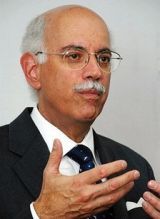US special envoy to Sudan says Darfur peace in sight
September 8, 2007 (Framingham) — The U.S. envoy to Sudan, Holliston native Andrew Natsios, yesterday said he is “guardedly optimistic” efforts to bring an end to the war-torn nation’s civil war and resulting genocide may soon pay off.

“It’s very complicated,” said Natsios. “It’s more complicated than Iraq or Afghanistan.”
The negotiations, however, are only one part of the effort to restore peace in Sudan.
Besides the upcoming peace talks, Natsios said, the Sudanese government has announced it will hold democratic elections in the next two years.
“That will determine if it’s a peaceful transition to a democratic system or not,” he said. “We don’t want the country to become a failed state.”
Unfortunately, Natsios said, there has been resistance to the elections from some rebel groups in the Darfur region.
“Some are obstructionists, some are making money off the conflict,” he said.
Bringing those groups to the table as part of the negotiations, which are set to begin on Oct. 31 in Libya, must be a goal, Natsios said, but a handful have so far resisted those efforts.
The third prong of the U.S. approach, he said, is humanitarian aid.
As it stands, the U.S. spends about $700 million to provide aid to about 2.5 million people in refugee camps.
The first steps will be to get the parties to agree to a cease-fire and come to the negotiating table, Natsios said. After that, the 24,000 United Nations peacekeepers – 4,000 police officers and 20,000 troops – can begin the work of protecting civilians and helping aid efforts, he said.
“If we get a peace settlement, the chances for the UN peacekeeping mission increase exponentially,” Natsios said.
The hope is the wide support for the U.S. among Sudanese – U.S. approval ratings are as high as 90 percent, Natsios said – will pressure the government and rebel leaders to hammer out a peace agreement.
“I think people are so angry in the camps…there’s a lot of pressure from the public for a settlement,” he said. “I think that public pressure is having an effect.
“I think we can use our stature and influence in that region. The problem is some of the rebel leaders are really obstructionist.”
(Metrowest Daily news)
